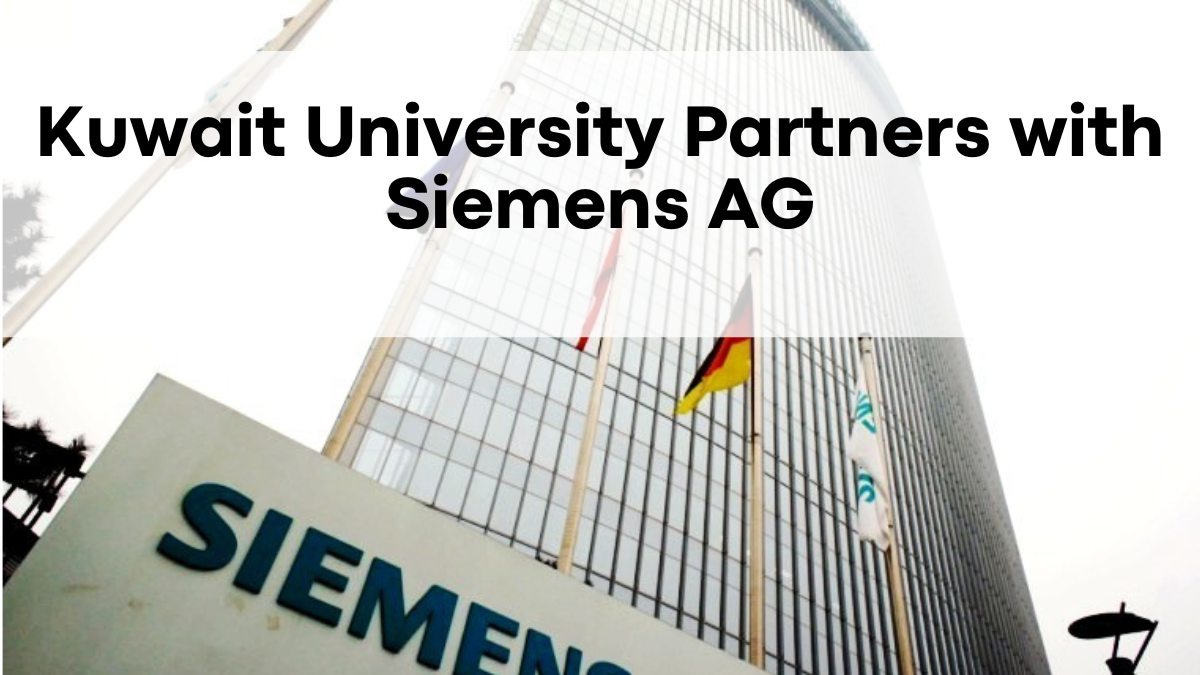In line with Kuwait’s national vision for a more sustainable and knowledge-driven future, Kuwait University has partnered with Siemens AG to establish advanced smart energy laboratories. The agreement, signed on May 27, 2024, brings together academic and industry leaders to support innovation, sustainability, and student training in next-generation energy technologies. This collaboration is a key milestone under the “New Kuwait 2035” strategic plan.

Kuwait University Partners with Siemens AG
| Key Details | Description |
|---|---|
| Partnership | Kuwait University (College of Engineering and Petroleum) and Siemens AG |
| Signing Date | May 27, 2024 |
| Location | Sabah Al-Salem University City |
| Initiative | Establishment of two smart labs: “Distributed Energy System Smart” and “Internet of Things (IoT)” |
| Objective | Support energy sustainability, student training, and innovation aligned with New Kuwait 2035 |
| Key Technologies | Photovoltaic systems, EV chargers, Microgrid Management, IoT solutions |
| Facilitator | Offset program by Kuwait Direct Investment Promotion Authority (KDIPA) |
| Official Link | Kuwait University |
Major Collaboration to Drive Energy Innovation
Strategic Partnership
The partnership between Kuwait University and Siemens AG was formalized in the presence of top university officials and Siemens leadership. Notable attendees included:
-
Professor Nawaf Al-Mutairi, Acting President of Kuwait University
-
Professor Asaad Abdulaziz Al-Rashed, VP for Planning
-
Professor Khaled Al-Hazzaa, Dean of the College of Engineering and Petroleum
-
Dr. Majid Majeed, Assistant VP for University Site Planning
-
Engineer Lamees Al-Khurafi, Planning Sector
-
Mr. Frank Neumann, Deputy Chief of Mission, German Embassy
-
Mr. Oliver Spierling, CEO of Siemens Kuwait
Role of KDIPA
This initiative is part of the offset program coordinated by the Kuwait Direct Investment Promotion Authority (KDIPA). The program aims to enhance technological infrastructure and strengthen Kuwait’s educational and economic landscape through international collaboration.
Two Smart Labs to Transform Energy Education
1. Distributed Energy System Smart Lab
This lab is a flagship “lighthouse project” that will support energy efficiency and sustainability on campus:
-
Installation of a 50KW photovoltaic system
-
Integration of three electric vehicle chargers
-
Deployment of a Microgrid Management System
-
Support for Kuwait University’s Green Building Initiative
-
Training platform for students in low-carbon energy systems
2. Internet of Things (IoT) Lab
Focused on digital innovation, the IoT lab will serve as a hub for teaching and research in:
-
Smart energy technologies
-
Data-driven infrastructure systems
-
Industrial applications of IoT
-
Support for Digitalization, Decentralization, and Decarbonization (3Ds)
Benefits for Students and the Economy
-
Equips students with hands-on experience in smart energy and digital systems
-
Enhances employability and readiness for roles in local industries
-
Boosts competitiveness of Kuwaiti firms through a skilled local workforce
-
Aligns with Kuwait’s vision for a knowledge-based economy
Professor Nawaf Al-Mutairi emphasized the importance of this collaboration, stating that it represents a major step toward sustainability and technological excellence. The initiative not only strengthens academic research but also accelerates Kuwait’s shift to a smarter and greener economy.
Frequently Asked Questions (FAQs)
What is the main goal of the Kuwait University and Siemens partnership?
To develop advanced smart energy and IoT laboratories that support research, student training, and Kuwait’s 2035 vision for sustainability and innovation.
Where will the new labs be located?
At the College of Engineering and Petroleum, Sabah Al-Salem University City.
How does this benefit students?
Students gain practical skills in energy management, digital systems, and sustainability, improving their job prospects and technical expertise.
What technologies will be implemented?
Solar PV systems, EV charging stations, microgrid management, and IoT-based smart solutions.
Who facilitated this collaboration?
The Kuwait Direct Investment Promotion Authority (KDIPA) through its offset program.
How does this align with New Kuwait 2035?
It supports the pillars of economic diversification, sustainable development, and innovation-driven education.
Click here to learn more
Pari is a passionate writer known for captivating stories that blend imagination and reality. Inspired by travel, history, and everyday moments, Pari crafts narratives that resonate deeply with readers.